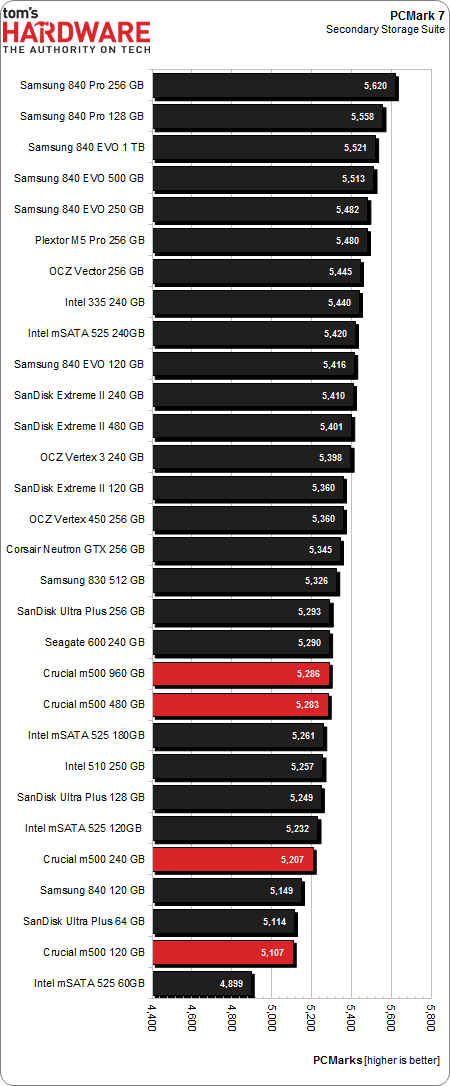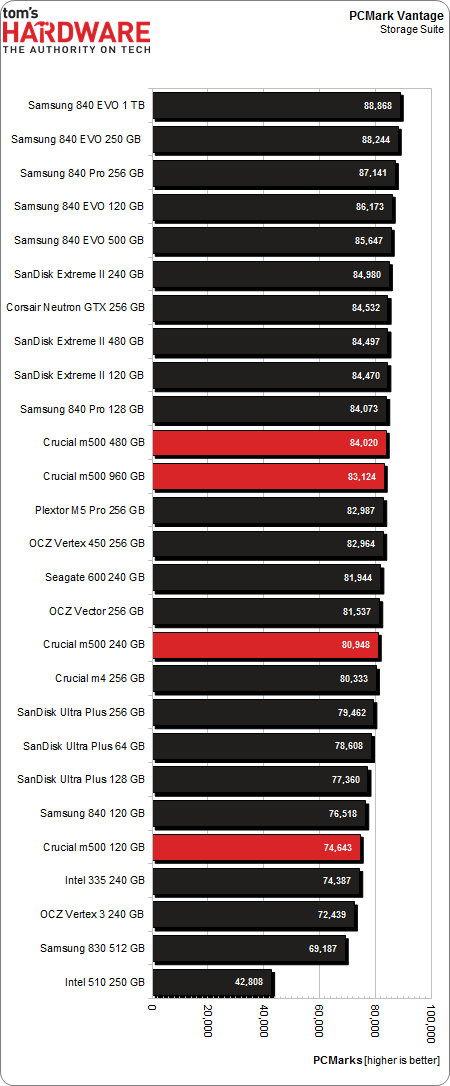SSD Deathmatch: Crucial's M500 Vs. Samsung's 840 EVO
Micron's consumer products division, Crucial, wasn't the first brand to introduce a 1 TB SSD. But it was the first to sell one for less than a fortune, and it sports some snazzy new features to boot. We got our hands on the entire line-up to test.
Results: PCMark 7 And PCMark Vantage
Futuremark's PCMark 7: Secondary Storage Suite
PCMark 7 uses the same trace-based technology as our Storage Bench v1.0 for its storage suite testing. It employs a geometric mean scoring system to generate a composite, so we end up with PCMarks instead of a megabytes per second. One-thousand points separate the top and bottom, but that encompasses a far larger difference than the score alone indicates.
This test is a big improvement over the older PCMark Vantage, at least for SSD benchmarking. The storage suite is comprised of several small traces. At the end, the geometric mean of those scores is scaled with a number representing the test system's speed. The scores generated are much different from PCMark Vantage, and many manufacturers are predisposed to dislike it for that reason. It's hard to figure out how PCMark 7 "works" because it uses a sliding scale to generate scores. Still, it represents one of the best canned benchmarks for storage, and if nothing else, it helps reinforce the idea that the differences in modern SSD performance don't necessarily amount to a better user experience in average consumer workloads.
The M500s place strangely. They don't light up the scoreboard, and I wasn't expecting that (particularly the two models placing way at the back). You shouldn't get hung up on one benchmark when it comes to characterizing a product's performance, but it's hard not to let the two smallest M500 SSD's scores taint our opinion. Shoot, the 120 GB is sandwiched between two 64 GB class SSDs, while the 240 GB is wedged between two 120 GB disks.
The 480 and 960 GB models register more respectable scores, though.
Futuremark's PCMark Vantage: Hard Drive Suite
PCMark's Vantage isn't the paragon of SSD testing, mainly because it's old and wasn't designed for the massive performance solid-state technology enables. Intended to exploit the new features in Windows Vista, Vantage was certainly at the forefront of consumer storage benching at the time. Vantage works by taking the geometric mean of composite storage scores and then scaling them a lot like PCMark 7 does. But in Vantage's case, this scaling is achieved by arbitrarily multiplying the geometric sub-score mean by 214.65. That scaling factor is supposed to represent an average test system of the day (a system that's now close to a decade behind the times). PCMark 7 improves on this by creating a unique system-dependent scaling factor and newer trace technology.
Get Tom's Hardware's best news and in-depth reviews, straight to your inbox.
Why bother including this metric, then? A lot of folks prefer Vantage in spite of or because of the cartoonish scores and widespread adoption. That, and the fact that most every manufacturer uses the aged benchmark in box specs and reviewer-specific guidelines. In fairness, Vantage's Hard Drive suite wasn't designed with SSDs in mind, and is actually quite good as pointing out which 5400 RPM mechanical disk might be preferable.
In the more heavily 4 KB-weighted Vantage testing, the lower-capacity M500s redeem themselves. The 120 GB version even scores above the Intel SSD 335 and OCZ Vertex 3, both with 20 nm flash (though still using 64 Gb dies).
Current page: Results: PCMark 7 And PCMark Vantage
Prev Page Results: Tom's Storage Bench, Continued Next Page Results: File Copy-
Someone Somewhere I think you mixed up the axis on the read vs write delay graph. It doesn't agree with the individual ones after, or the writeup.Reply -
Someone Somewhere Even 3bpc SSDs should last you a good ten years...Reply
The SSD 840 is rated for 1000 P/E cycles, though it's been seen doing more like ~3000. At 10GB/day, a 240GB would last for 24,000 days, or about 766 years, and that's using the 1K figure.
You're free to waste money if you want, but SLC now has little place outside write-heavy DB storage.
EDIT: Screwed up by an order of magnitude. -
cryan Reply11306005 said:I think you mixed up the axis on the read vs write delay graph. It doesn't agree with the individual ones after, or the writeup.
You are totally correct! You win a gold star, because I didn't even notice. Thanks for catching it, and it should be fixed now.
Regards,
Christopher Ryan
-
cryan Reply11306034 said:I would only buy SSD that uses SLC memory. I dont wan't to buy new drive every year or so.
Not only are consumer workloads completely gentle on SSDs, but modern controllers are super awesome at expanding NAND longevity. I was able to burn through 3000+ PE cycles on the Samsung 840 last year, and it only is rated at 1,000 PE cycles or so. You'd have to put almost 1 TB a day on a 120 GB Samsung 840 TLC to kill it in a year, assuming it didn't die from something else first.
Regards,
Christopher Ryan
-
Someone Somewhere I'd like to see some sources on that - for starters, I don't think the 840 has been out for a year, and it was the first to commercialize 3bpc NAND.Reply
You may be thinking of the controller failures some of the Sandforce drives had, which are completely unrelated to the type of NAND used. -
mironso Well, I must agree with Someone Somewhere. I would also like to see sources for this statement: "Yes, in theory they last 10 years, in practise they last a year or so.".Reply
I would like to see, can TH use SSD put this 10GB/day and see for how long it will work.
After this I read this article, I think that Crucial's M500 hit the jackpot. Will see Samsung's response. And that's very good for end consumer. -
edlivian It was sad that they did not include the samsung 830 128gb and crucial m4 128gb in the results, those were the most popular ssd last year.Reply -
Someone Somewhere You can also find tens of thousands of people not complaining about their SSD failing. It's called selection bias.Reply
Show me a report with a reasonable sample size (more than a couple of dozen drives) that says they have >50% annual failures.
A couple of years ago Tom's posted this: http://www.tomshardware.com/reviews/ssd-reliability-failure-rate,2923.html
The majority of failures were firmware-caused by early Sandforce drives. That's gone now.
EDIT: Missed your post. First off, that's a perfect example of self-selection. Secondly, those who buy multiple SSDs will appear to have n times the actual failure rate, because if any fail they all appear to fail. Thirdly, that has nothing to do with whether or not it is a 1bpc or 3 bpc SSD - that's what you started off with.
This doesn't fix the problem of audience self-selection
-
Someone Somewhere You were however trying to stop other people buying them...Reply
Sounds a bit like a sore loser argument, unfortunately.
SSDs aren't perfect, but they generally do live long enough to not be a problem. Most of the failures have been overcome by now too.
Just realised there's an error in my original post - off by a factor of ten. Should have been 66 years. -
warmon6 Reply11306841 said:I am not talking about Samsung SSD-s, I am talking about SSDs in general. And I am not going to provide any sources because SSD fail all the time after a year or so. That is the raility. You can find, on the internet, people complaining abouth their SSD failing. There are a lot of them...
Also, SLC based SSD-s are usually "enterprise", so they are designed for reliability and not performance, and they don't use some bollocks, overclocked to the point of failure, controllers. And have better optimised firmware...
Tell that to all the people on this forum still running intel X-25M that launched all the way back in 2008 and my Samsung 830 that's been working just fine for over a year.......
See what you're paying attention too is the loudest group of ssd owners. The owners that have failed ssd's.
See it's the classic "if someone has a problem, there going to be the one that you hear and the quiet group, isn't having the problem" issue.
Those that dont have issues (such as myself) dont mention about our ssds and is probably complaining about something else that has failed.

